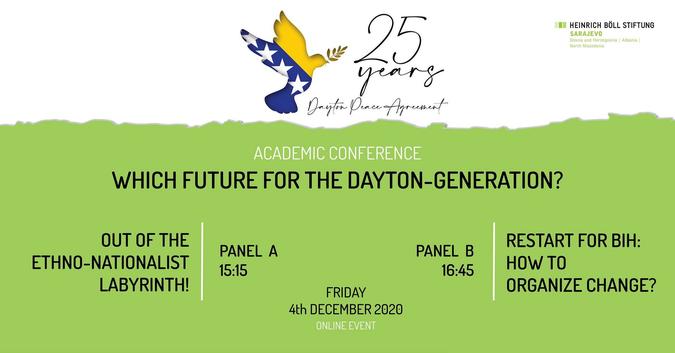25 years after: Which Future for the Dayton-Generation?

Ultimo appuntamento della conferenza "The ‘Dayton-Generation’: The Future of Bosnia in the Eyes of Young People" che ha coinvolto diversi enti di Sarajevo tra il 2 e il 4 dicembre 2020
December 2020 marks the 25th anniversary of the Dayton Peace Accords (DPA). One generation has passed since the end of the war, the international community has long reduced its presence and engagement, and Bosnia and Herzegovina (BiH) has applied for EU membership. In its Opinion from May 2019, the European Commission has analyzed the current state of preparation and indicated the reform priorities for EU accession. Constitutional issues feature prominently, in particular the dysfunctionality of a complex and fragmented institutional set-up, as well as the exclusion and discrimination of citizens through rigid ethnic power-sharing arrangements. The current crisis related to the spread of the corona virus will have substantial economic and social consequences for the country and might act as a catalyst for change of its economic, social and political system.
The academic conference shall discuss the position and challenges of the Dayton-generation for the future of BiH, as well as possibilities to enhance dialogue between youth and policymakers, building on comparative cases from Europe. Participants may also discuss the results of both, the survey and scenario-building, as well as the key elements that emerged during the roundtables of the policy-focused event. These will be compared with their own analysis and evaluation of present and future of the Dayton Constitution and the situation in the country. A first panel shall focus on the substance of the challenges, while a second one will deal with methodological and policy issues on how to organize (constitutional) change.
AGENDA
15.00 Welcome and Opening Remarks
________________
15.15 PANEL A: Out of the ethno-nationalist labyrinth!
Where do we go from here? What needs to be changed?
Based on the results of the survey and the views of young people, the following questions will be explored in greater depth: What needs to be changed? What are the key issues preventing positive sustainable development? What does "legitimate representation" mean in power sharing systems? (Where) Does the "citizen principle" have place in those systems? Which are the responsibilities of the EU and IC? Academic analysis.
Moderator: Jens Woelk, University of Trento (Italy)
Statement: Azra Zornić, complainant at the ECtHR, Strasbourg
Speakers:
- Joseph Marko, University of Graz, Austria
- Alison McCulloch, Brandon University, Manitoba, Canada
- Anes Makul, PhD University of Vienna, Tuzla, Bosnia and Herzegovina
Discussants: Sören Keil, Christchurch University, Canterbury (UK)
________________
16.45 PANEL B. Restart for BiH: How to organize change?
How can we get there? How to organize change?
How can citizens become directly involved in the discussion of fundamental, constitutional issues? Can participatory democracy or similar procedures also be applied in BiH? Can they offer an alternative to the current Realpolitik? Can they provide an incentive for change or become a first step towards change? Discussion with people actively committed to change.
Moderator: Marion Kraske, Director HBS Sarajevo
Video-statement: Manuel Sarrazin, Member of German Bundestag, Berlin
Speakers:
- Lejla Gacanica, Associaton Women for Constitutional Change, Banja Luka
- Irma Baralija, political activist, Mostar
- Valery Perry, DPC Senior Associate, Democratic Policy Council, Berlin, Germany
- Prof. dr. Nedim Ademović, lawyer
Discussant: Damir Kapidžić, University of Sarajevo
________________
18.15 Concluding remarks
REGISTER HERE: https://bit.ly/25YDPA_REGISTER

